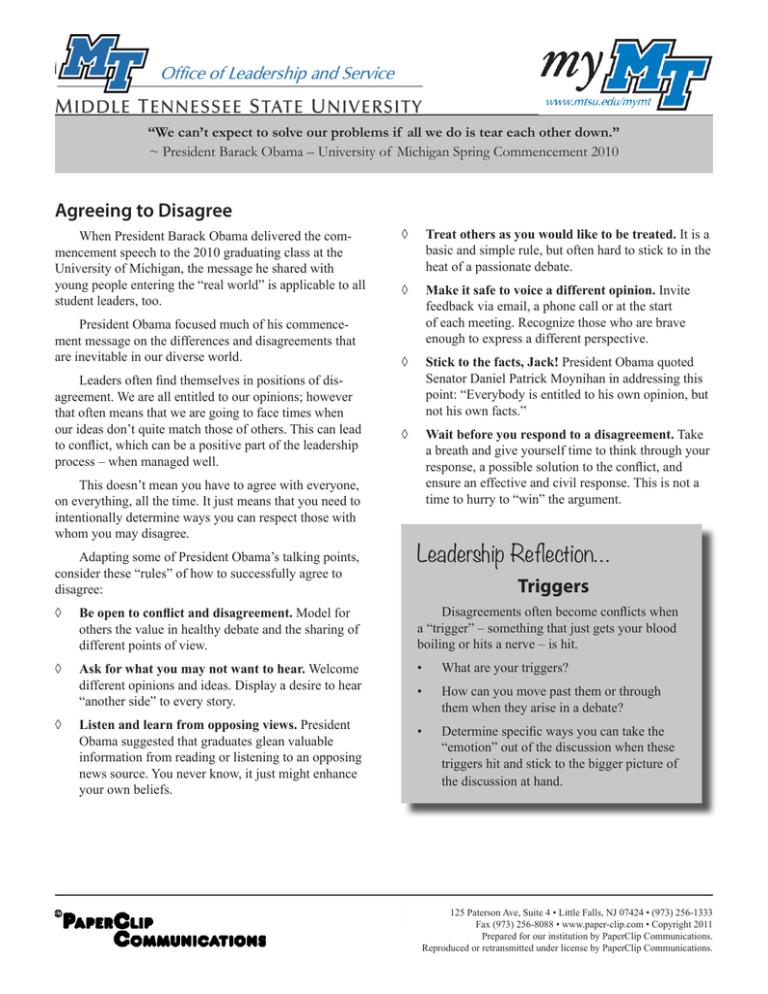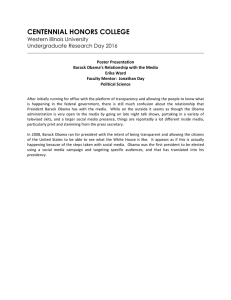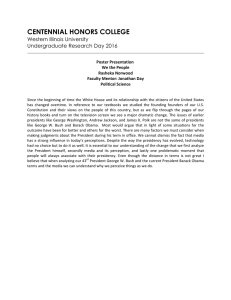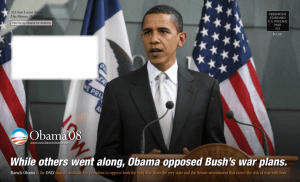Leadership Lessons 2012 Leadership Challenges Agreeing to Disagree
advertisement

Leadership Lessons 2012 Leadership Challenges “We can’t expect to solve our problems if all we do is tear each other down.” ~ President Barack Obama – University of Michigan Spring Commencement 2010 Agreeing to Disagree When President Barack Obama delivered the commencement speech to the 2010 graduating class at the University of Michigan, the message he shared with young people entering the “real world” is applicable to all student leaders, too. President Obama focused much of his commencement message on the differences and disagreements that are inevitable in our diverse world. Leaders often find themselves in positions of disagreement. We are all entitled to our opinions; however that often means that we are going to face times when our ideas don’t quite match those of others. This can lead to conflict, which can be a positive part of the leadership process – when managed well. This doesn’t mean you have to agree with everyone, on everything, all the time. It just means that you need to intentionally determine ways you can respect those with whom you may disagree. ◊ Treat others as you would like to be treated. It is a basic and simple rule, but often hard to stick to in the heat of a passionate debate. ◊ Make it safe to voice a different opinion. Invite feedback via email, a phone call or at the start of each meeting. Recognize those who are brave enough to express a different perspective. ◊ Stick to the facts, Jack! President Obama quoted Senator Daniel Patrick Moynihan in addressing this point: “Everybody is entitled to his own opinion, but not his own facts.” ◊ Wait before you respond to a disagreement. Take a breath and give yourself time to think through your response, a possible solution to the conflict, and ensure an effective and civil response. This is not a time to hurry to “win” the argument. Leadership Reflection… Adapting some of President Obama’s talking points, consider these “rules” of how to successfully agree to disagree: Triggers ◊ Be open to conflict and disagreement. Model for others the value in healthy debate and the sharing of different points of view. Disagreements often become conflicts when a “trigger” – something that just gets your blood boiling or hits a nerve – is hit. ◊ Ask for what you may not want to hear. Welcome different opinions and ideas. Display a desire to hear “another side” to every story. • What are your triggers? • Listen and learn from opposing views. President Obama suggested that graduates glean valuable information from reading or listening to an opposing news source. You never know, it just might enhance your own beliefs. How can you move past them or through them when they arise in a debate? • Determine specific ways you can take the “emotion” out of the discussion when these triggers hit and stick to the bigger picture of the discussion at hand. ◊ 5 125 Paterson Ave, Suite 4 • Little Falls, NJ 07424 • (973) 256-1333 Fax (973) 256-8088 • www.paper-clip.com • Copyright 2011 Prepared for our institution by PaperClip Communications. Reproduced or retransmitted under license by PaperClip Communications.





